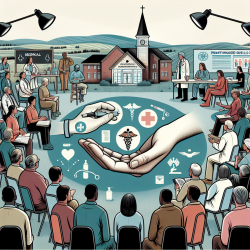Introduction
The opioid crisis has significantly impacted rural communities across the United States, where access to treatment and prevention resources is often limited. A recent study, "Community Meetings on the Rural Opioid Crisis: Setting a Path Forward by Learning from Others," highlights how community meetings can play a crucial role in shaping effective strategies to combat this epidemic. This blog explores how practitioners can enhance their skills by implementing the outcomes of this research or by engaging in further studies.
Understanding the Research
The study was conducted in Ardmore, Oklahoma, a rural community severely affected by the opioid crisis. Through a series of community meetings, local stakeholders were introduced to various programs aimed at addressing opioid misuse. The meetings facilitated discussions that helped participants develop a consensus on where resources should be allocated in the future.
Key Findings and Implications for Practitioners
The research revealed several critical insights that practitioners can leverage to improve their approach to tackling the opioid crisis:
- Community Engagement: The study underscores the importance of involving local stakeholders in discussions about resource allocation. Practitioners should prioritize community engagement to ensure that strategies are relevant and supported by those directly affected.
- Focus on Treatment Options: Participants identified accessible opioid treatment options as a top priority. Practitioners should advocate for expanding treatment services, particularly in rural areas where options are limited.
- Youth-Based Prevention Efforts: The study highlighted the need for youth education programs to reduce future opioid misuse. Practitioners should consider implementing or supporting programs that target young populations to prevent early drug use.
- Data-Driven Decision Making: The research demonstrated that opinions can change through informed discussions. Practitioners should use data and expert insights to guide community conversations and decision-making processes.
Encouraging Further Research
While the study provides valuable insights, it also highlights areas for further research. Practitioners are encouraged to explore the following:
- Longitudinal Studies: Conducting longitudinal studies in other rural communities can help determine if the findings are applicable across different settings.
- Program Effectiveness: Further research is needed to evaluate the effectiveness of specific programs, such as youth education initiatives, in reducing opioid misuse.
- Resource Allocation Strategies: Investigating how different resource allocation strategies impact community outcomes can provide guidance for optimizing efforts.
Conclusion
Community meetings offer a powerful platform for addressing the opioid crisis in rural areas by fostering collaboration and informed decision-making. Practitioners can enhance their skills by implementing the study's findings and engaging in further research to develop effective, community-supported strategies.
To read the original research paper, please follow this link: Community Meetings on the Rural Opioid Crisis: Setting a Path Forward by Learning from Others.










